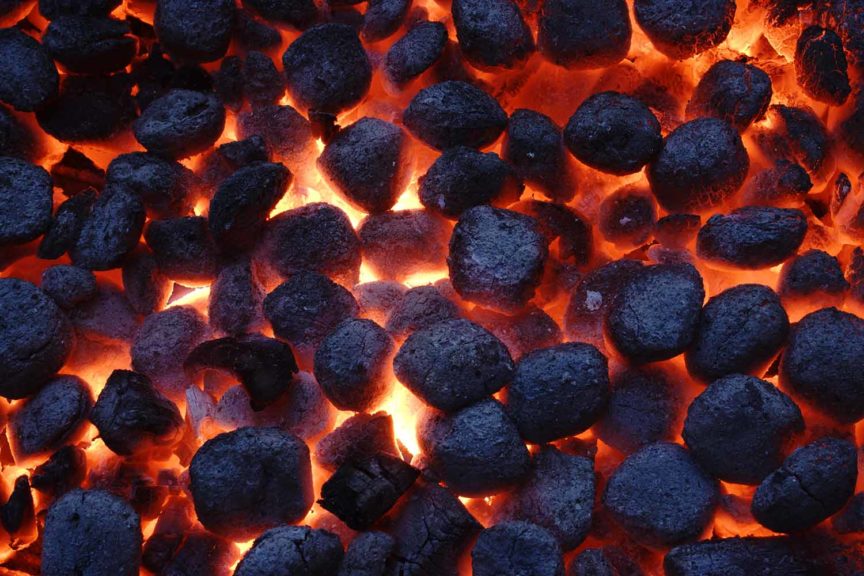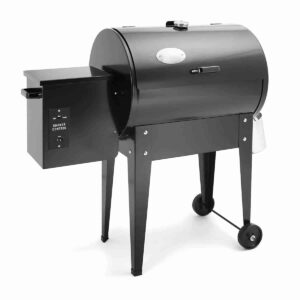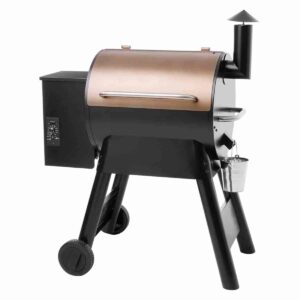Grilling is a simple way to achieve complex flavor in your food, and although all you need is a good fire to grill, the right tools can really make all of the difference. When it comes to grilling tools, the first thing you will want to consider is which kind of charcoal you would like to use, wood charcoal (lumps) or briquettes.
What’s better, charcoal or briquettes? Both types of charcoal have various pros and cons. Even experts debate on the superior charcoal type for different applications! To find out what is right for you, there are a lot of factors to consider.
Even if you think you have a favorite charcoal type already, it is worth taking the time to experiment and see what works best for you and your grilling style. It is entirely possible you will prefer one type of charcoal in one application, while preferring the other type when grilling with different circumstances or meat cuts.
The Difference Between Charcoal and Briquettes
We should first talk about what makes up these two different types of charcoal so we can fully understand why they are so different. Both types of charcoal are made with wood, however briquettes have additives while lump charcoal is purely wood.
To elaborate, lump charcoal is often made not only from only wood, but it is often advertised as a specific type of wood that will change the flavor and cooking heat in a specific way. On the other hand, briquettes are made from left over wood and sawdust, as well as additives.
To elaborate on how charcoal is made, both types are made with wood that is burned with very little oxygen. What this does is leaves behind the charcoal we are used to, which is essentially just carbon. The wood in both lump charcoal and briquettes originates usually as scrap lumber.
While the inclusion of additives in briquettes turns many grillers away, it should not immediately discourage you from using them. There are plenty of reputable brands that use all-natural briquettes that can alleviate any fears you may have about the additives within the briquettes themselves.
Often additives are just used to hold the materials together, however some brands will add lighter fluids to make starting easier. It is often recommended to avoid the briquettes that have lighter fluids included within them.
When looking at charcoal, it is important to understand the types of wood that can be used. Each type of wood burns at different heats, and can provide completely different flavors. With that being said, they also come at very different price points.
Popular Wood Types of Charcoal:
- Alder – Mild and sweet, a less popular wood type but is good with fish and chicken.
- Apple – A popular choice for fish and pork since it has a more delicate, sweet smoke.
- Binchotan – Also known as Japanese Oak, it is a new type that has started to gain traction. It is said to burn longer and hotter than other types of charcoal.
- Cherry – Cherry is prefered for delicate meat like duck and salmon due to it’s unique and sweet smoke.
- Chestnut – Provides a nutty flavor.
- Hickory – Probably the most popular wood type, it has a very strong flavor.
- Mesquite – Often used for beef, fish and chicken, has a mild woodsy flavor.
- Oak – Oak also has a strong flavor, but is more bitter than hickory.
Both briquettes and lump charcoal can gain the benefits of these different types of wood, however lump charcoal is more likely to showcase the above features.
It is also important to note that one of the biggest downsides to the additives in briquettes is the potential for a chemically flavor, depending on the brand and the ingredients used. This tends to be most prominent in the ones that include lighter fluid
Which One Is Better: Charcoal or Briquettes?
Now that we have laid down what the inherent differences between the creation of lump charcoal and briquettes, it is time to talk about the advantages and disadvantages between the two types.
Though there are loud opinions on both sides of the argument about the superior charcoal, everyone can agree there are pretty obvious pros and cons to the two different types.
Why should you use Lump Charcoal?
- It gets extremely hot very quickly, usually within 15 minutes. Briquettes get up to 800 degrees Fahrenheit while lump charcoal can get up to 1400 degrees Fahrenheit.
- There is less ash production in comparison to briquettes, leaving less cleanup.
- Contains no additives, where briquettes can contain a lot of chemicals that will change the flavor of your food negatively.
- It is more receptive to oxygen. This means that if your grill has adjustable air vents, you can better control the temperature.
Why should you use Briquettes?
- Though Lump Charcoal can get hotter, and does so faster, briquettes stay hotter longer and more consistently.
- It is easier to get an even cook, seeing as it is a uniform shape. You will avoid heat pockets and holes more easily.
- It usually is significantly less expensive than lump charcoal.
- It is much less difficult to use, and requires less work in the setup phase.
There is a lot to take into consideration here. When looking at these different factors, remember a lot of it comes down to the quality of the item you are buying.
While a lot of lump charcoal can have issues with size inconsistency in the chunks, good brands will be more consistent. Also, like mentioned before, there are briquette brands that leave out additives that will cause taste issues in your food.
The convenience factor of the cheaper and less fickle briquettes is undeniable, but purists swear that the taste difference between lump and charcoal is extremely noticeable.
On the other hand, some people argue that the taste difference between briquettes and lump charcoal is negligible in most applications.
Some people even suggest doing a mixed fire, which includes some briquettes and some lump charcoal.
This would mean your fire will get hot, quickly, but also have some more consistency if you plan on cooking for longer. This does require a bit more research into brands that you would like, and experimentation to see what works together well.
An alternative to the mixed fire would be cooking with logs instead of charcoal, but it requires a lot of knowledge to do correctly. Raw wood gives off volatile gasses, which makes cooking with it a whole different ball game.
Should I Use Charcoal or Briquettes?
It is decision making time. You now know the pros and the cons to both kinds of charcoal, but what is going to fit best for you? Really, there are many factors to consider before making your choice.
First, how long do you plan on cooking your food? Many experts suggest that if you plan on cooking something for less than two hours, at a high heat and quickly, that it is much better to use lump charcoal. If you are cooking slow and at a lower heat, many suggest the briquettes due to their ability to stay hotter for longer periods of time consistently.
Though the above advice is a good rule of thumb, it is still said that if you are able to closely monitor your grill and continually give it attention, a long grill with lump charcoal gives you a much better product.
If you think about the application, however, you aren’t going to be able to give your charcoal the attention it needs if you are preparing food at a large event or while also trying to watch children or the family pet.
Factors to Consider When Choosing a Charcoal:
- How long do you plan on cooking your food? If it is a long time (2+ hours), you may want to consider briquettes.
- How much are you willing to spend on your charcoal? Briquettes tend to be much cheaper.
- What is your taste preference? Do you want the taste advantages from lump charcoal?
- If you want the benefits of both, should you take the time to do a mixed fire?
- Are you very new to charcoal grilling? Briquettes are much easier to use when starting out.
- How do you plan on cooking your meat? If you want a fast and hot sear, lump charcoal is usually the way to go.
The first thing that you will need to consider when choosing a charcoal is how long you plan on cooking your food. If the answer to this question is something longer than 2 hours, you should go with briquettes instead.
In addition, you should think about how much you are willing to spend on your charcoal. Along with all of the fundamental differences between the two choices, the briquettes tend to be a lot cheaper than traditional charcoal.
You should also consider what your taste preference is, due to the fact that lump charcoal gives off a very distinct flavor.
However, just because there are differences between the two does not mean that you have to limit your decision to just one. Instead, you can get the benefits of both by creating a mixed fire.
This will definitely take some extra time for preparations, but it will be well worth it once you have achieved the results that you originally desired.
If you are a beginner to charcoal grilling, you should probably go with briquettes since they are generally easy to use.
The cook and sear that you want to get on your meat will also play a big part in the option that you choose. To be more specific, you should use lump charcoal for a fast and hot sear, or briquettes for a more even all-around cook on your meat.
The final thing to consider is the DIY charcoal movement. Some people have started to use small kilns to make their own lump charcoal out of scrap wood, instead of purchasing it ready to use at the store.
If you have the extra time, this could help negate the usually higher cost of lump charcoal, and would allow you to experiment with local wood types while grilling.
After considering all of these factors, start experimenting with different brands and types of charcoal to really narrow down what works best for you and your grilling methods. Most importantly, if you find a brand of charcoal that you really like, make sure to make note of it and which applications you like it best for!
Check out our Recent Posts
Z Grills Review
If you’re looking for a grill that will last, Z Grills is the way to go. Z grills are made of the best quality materials...
Read MorePit Boss Pellet Grill Review
Pit Boss is one of many when it comes to manufacturers of wood pellet grills and smokers. If you have spent any amount of time...
Read More10 Fun Benefits of Taking an Online Cooking Class
There’s never been a better time to take an online cooking class. With the continued popularity of online learning, there are more and more exciting...
Read More



